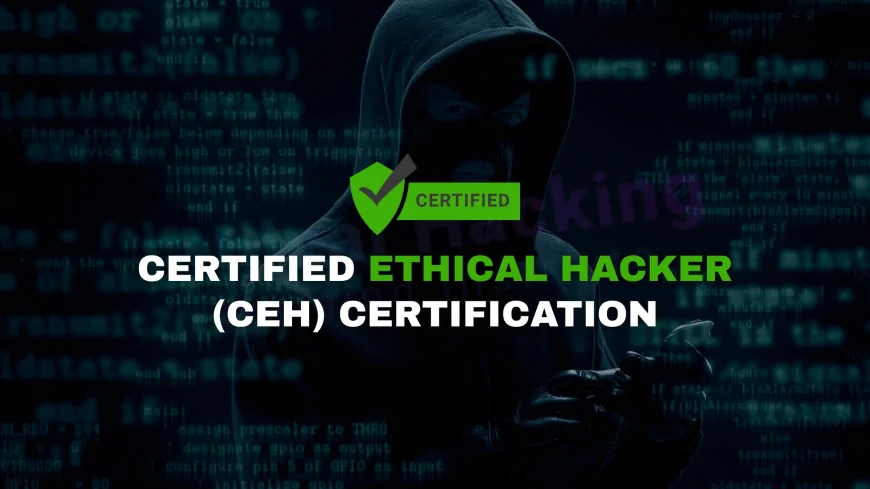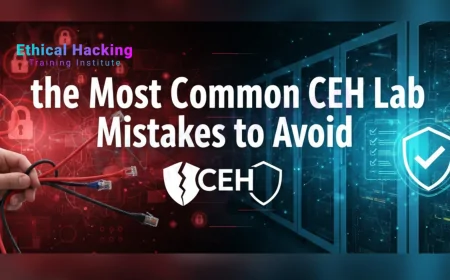The Importance of the Certified Ethical Hacker Certificate in the Cybersecurity Industry | How a Certified Ethical Hacker Certification Impacts the Cybersecurity Field
Discover why the Certified Ethical Hacker (CEH) certification is vital in today’s cybersecurity industry. Learn about its global value, skills gained, career benefits, and how it positions you for success in ethical hacking and cyber defense.

Table of Contents
- Introduction
- What is the CEH Certificate?
- Why the CEH Certification is Important in Cybersecurity
- Key Skills Gained from CEH Certification
- Industries and Careers That Require CEH
- Global Recognition of the CEH Credential
- CEH vs Other Cybersecurity Certifications
- How to Prepare for the CEH Exam
- CEH Exam Details and Structure
- Benefits of Getting CEH Certified
- CEH Certification Cost and ROI
- Ethical Hacking in Practice
- CEH and Government/Military Recognition
- What Employers Think About CEH
- What Comes After CEH?
- Real-World Success Stories with CEH
- Common Misconceptions About CEH
- Is the CEH Certification Right for You?
- FAQs
- Conclusion
Introduction
In the rapidly evolving digital age, cybersecurity is no longer optional—it's essential. Organizations across the world are in dire need of skilled professionals to defend their systems, data, and networks. One credential that continues to rise in value is the Certified Ethical Hacker (CEH) certification. This globally respected credential validates a professional’s ability to think and act like a hacker—ethically—to strengthen security systems and uncover vulnerabilities before malicious actors do.
What is the CEH Certificate?
"The Certified Ethical Hacker (CEH) certification, offered by the EC-Council (International Council of E-Commerce Consultants), validates an individual’s skills in ethical hacking and network security from a vendor-neutral standpoint. It signifies that the holder has a solid understanding of how to identify, assess, and address vulnerabilities in computer systems and networks using the same tools and techniques as malicious hackers—but in a lawful and legitimate manner."
-
Identify weaknesses in systems
-
Use tools used by real hackers
-
Secure environments against cyber threats
Why the CEH Certification is Important in Cybersecurity
- Strengthens the workforce by providing in-demand cybersecurity skills.
-
Trains professionals in real-world hacking scenarios.
-
Equips candidates with hands-on penetration testing skills.
-
Enhances a security team’s ability to anticipate and neutralize threats.
-
Recognized globally by governments, militaries, and corporations.
Key Skills Gained from CEH Certification
-
Footprinting and reconnaissance
-
Network scanning and enumeration
-
System hacking
-
Malware threats and analysis
-
Web application and wireless hacking
-
Cryptography
-
Social engineering and evasion tactics
-
Cloud and IoT vulnerabilities
These skills are not only theoretical but are gained through realistic labs and exercises in CEH training.
Industries and Careers That Require CEH
Industries:
-
IT & Tech Companies
-
Financial Services
-
Government Agencies (DoD, Homeland Security)
-
Healthcare & Insurance
-
E-commerce Platforms
Career Roles:
-
Ethical Hacker
-
Security Analyst
-
Penetration Tester
-
Cybersecurity Consultant
-
Security Operations Center (SOC) Analyst
-
Information Security Officer
Global Recognition of the CEH Credential
-
Approved by the U.S. Department of Defense (DoD 8570/8140).
-
Recognized in 160+ countries.
-
Frequently listed in job descriptions for cybersecurity roles.
-
Integrated in curriculum at top universities and institutions worldwide.
CEH vs Other Cybersecurity Certifications
| Certification | Focus Area | Practical? | Recognition |
|---|---|---|---|
| CEH | Ethical Hacking | Yes | Global |
| OSCP | Offensive Security | Yes | Highly practical |
| CISSP | Information Security Management | No | Leadership focus |
| CompTIA Security+ | Entry-Level Security | Basic | Beginner-friendly |
The CEH balances theoretical knowledge and hands-on practicals, making it ideal for mid-level professionals.
How to Prepare for the CEH Exam
-
Access EC-Council’s official training through flexible online or on-site options.
-
Use CEH v13 study guides and practice questions.
-
Access labs via EC-Council’s iLabs or CyberQ platform.
-
Take mock exams and time-based simulations.
-
Join discussions in ethical hacking forums to stay updated and learn with others.
CEH Exam Details and Structure
-
Exam Code: 312-50 (ECC Exam) or EC-Council exam.
-
Duration: 4 hours
-
Format: 125 multiple-choice questions
-
Passing Score: 60% to 85% (based on difficulty)
-
Languages: English, French, Spanish, and more
For hands-on proof, candidates may also pursue CEH Practical (6-hour exam).
Benefits of Getting CEH Certified
-
High salary potential (₹7–20 LPA in India, $90k–$150k globally)
-
Competitive edge in job applications
-
Globally portable credential
-
Improved security awareness and problem-solving
-
Access to EC-Council’s continuing education and job portal
CEH Certification Cost and ROI
-
Training Cost: ₹30,000 to ₹80,000 depending on mode
-
Exam Fee: ~$950 (can vary)
-
CEH Practical: ~$550 (optional but recommended)
ROI is high due to increased job prospects, promotions, and consultancy opportunities.
Ethical Hacking in Practice
Organizations rely on ethical hackers to simulate breaches, uncovering and addressing system flaws before they lead to issues such as:
-
Financial loss
-
Reputational damage
-
Compliance failures
CEH and Government/Military Recognition
CEH is one of the few certifications accepted by the U.S. DoD and military services around the world. It’s listed under:
-
DoD 8570 / 8140 directives
-
NICE Cybersecurity Workforce Framework
-
National Initiative for Cybersecurity Careers and Studies (NICCS)
What Employers Think About CEH
Most hiring managers prefer candidates who:
-
Possess recognized certifications
-
Can demonstrate real-world attack simulations
-
Understand cybersecurity from an attacker’s mindset
CEH fulfills these expectations.
What Comes After CEH?
-
CEH Practical – for real-world skills
-
CHFI (Computer Hacking Forensic Investigator)
-
ECSA (EC-Council Certified Security Analyst)
-
OSCP (Offensive Security Certified Professional)
-
CISSP – for management-level roles
Real-World Success Stories with CEH
Many professionals credit CEH as a turning point in their careers. Examples:
-
A software engineer shifting to cybersecurity and becoming a Lead SOC Analyst
-
A fresher with CEH landing an InfoSec internship in a Fortune 500 company
-
Government employees moving into cybercrime and digital forensics roles
Common Misconceptions About CEH
-
"CEH teaches you to hack illegally."
CEH promotes ethical, legal hacking practices. -
"It's just theory."
CEH includes hands-on labs and real-world tools. -
"It's only for experts."
CEH is suited for those with basic knowledge in networking or IT.
Is the CEH Certification Right for You?
If you’re:
-
Passionate about cybersecurity
-
Interested in ethical hacking
-
Looking for career growth
-
Willing to commit to continuous learning
…then CEH is absolutely for you!
Frequently Asked Questions (FAQs)
1. What is the CEH certification?
The Certified Ethical Hacker (CEH) certification validates skills in ethical hacking, penetration testing, and cybersecurity defense strategies.
2. Who issues the CEH certification?
The CEH certification is issued by EC-Council (International Council of E-Commerce Consultants), a globally recognized certifying body.
3. Is CEH certification globally recognized?
Yes, CEH is recognized in over 160 countries and accepted by major companies, government organizations, and defense institutions worldwide.
4. How much does the CEH certification cost?
The cost typically ranges from ₹50,000 to ₹80,000 in India, depending on the training mode and inclusion of exam vouchers.
5. Is CEH suitable for beginners?
Yes, individuals with basic knowledge of networking, IT, or cybersecurity fundamentals can pursue CEH.
6. What are the prerequisites for CEH?
There are no strict prerequisites, but it is recommended to have at least two years of experience in IT or complete EC-Council's official training.
7. How long is the CEH exam?
The CEH exam is 4 hours long and contains 125 multiple-choice questions.
8. What is the passing score for CEH?
The passing score ranges from 60% to 85%, depending on the exam difficulty level set by EC-Council.
9. What is CEH v13?
CEH v13 is the latest version of the certification, updated with modern tools, AI-based threats, cloud security, and enhanced labs.
10. What topics are covered in the CEH certification?
Topics include footprinting, scanning, system hacking, malware analysis, social engineering, IoT, cloud security, and cryptography.
11. What is the CEH Practical exam?
CEH Practical is a 6-hour hands-on test where candidates demonstrate their hacking and security testing skills in real-world scenarios.
12. Is CEH better than OSCP?
CEH is more theoretical with practical labs, ideal for beginners to intermediate professionals, while OSCP is highly hands-on and suited for advanced practitioners.
13. What are the career benefits of CEH?
CEH helps professionals land roles such as ethical hackers, penetration testers, SOC analysts, and cybersecurity consultants with higher salary potential.
14. Is CEH accepted by the government or military?
Yes, CEH is approved under DoD 8570/8140 guidelines and accepted by U.S. military and other international government agencies.
15. Does CEH require programming knowledge?
While not mandatory, basic scripting knowledge (like Python or Bash) is helpful for deeper understanding and real-world testing.
16. How long is the CEH certification valid?
CEH certification is valid for 3 years and can be renewed through EC-Council’s ECE (Continuing Education) program.
17. Can I take the CEH exam online?
Yes, EC-Council offers both remote proctoring and in-person testing at authorized test centers.
18. What is the average salary of a CEH professional?
In India, CEH-certified professionals earn between ₹7–20 LPA. In the U.S. and other countries, salaries range from $90,000 to $150,000.
19. What training options are available for CEH?
Options include online instructor-led classes, self-paced video courses, classroom training, and official EC-Council academies.
20. Is CEH worth it in 2025 and beyond?
Absolutely. With increasing cyber threats and a growing need for skilled professionals, CEH remains a highly valuable credential.
Conclusion
The Certified Ethical Hacker (CEH) certification stands as a cornerstone in the world of cybersecurity. It equips professionals with not just technical skills but the mindset to think like a hacker—and act as a guardian. With rising cyber threats, the demand for CEH-certified professionals is growing rapidly across sectors.
Investing in CEH is more than just earning a certificate—it’s about becoming an ethical defender in the digital world.
What's Your Reaction?
 Like
0
Like
0
 Dislike
0
Dislike
0
 Love
0
Love
0
 Funny
0
Funny
0
 Angry
0
Angry
0
 Sad
0
Sad
0
 Wow
0
Wow
0

















